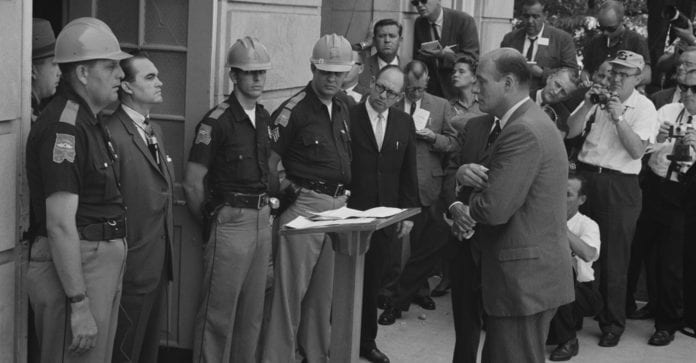By Stacy M. Brown, NNPA Newswire Correspondent
@StacyBrownMedia
The spectre of white nationalists, neo-Nazis, white supremacists and others that wrongly maintain that the American flag and free speech provide them with moral justification and protection for their abhorrent behaviors, has seen too many journalists frame their inadequate coverage under a cloak of “objectivity.” Journalism is reverting to the impersonal mode of coverage that chronicled the civil rights movement: The Spectator’s Perspective.
That the President of the United States can get away with telling four American citizens and congresswomen of color to “go back to your country,” reminds too many black journalists of a strikingly similar message from Alabama Governor George Wallace, a Democrat, more than 50 years ago.
During his 1963 inaugural speech, Wallace said: “I draw the line in the dust and toss the gauntlet before the feet of tyranny, and I say segregation now, segregation tomorrow and segregation forever.”
In its All Things Considered and Radio Diariesseries, NPR called the speech, “A fiery pledge forgiven, but not forgotten.”
“Reflecting on his response to the speech at the time,” writes NPR, “Rep. John Lewis, a Georgia Democrat, originally from Alabama, says he took Wallace’s words personally. ‘My governor, this elected official, was saying in effect, you are not welcome, you are not welcome. Words can be very powerful. Words can be dangerous,’ Lewis says. ‘Gov. Wallace never pulled a trigger. He never fired a gun. But in his speech, he created the environment for others to pull the trigger, in the days, the weeks and months to come.’”
Reporting both sides of a viewpoint may enable a publication to boast about high journalistic standards but ignoring larger truths in the process nullifies any benefits gained.
Earlier this month, while in the midst of a rant-by-racist-tweet barrage from the fingertips of President Trump, the New York Timesran the headline, “Trump Urges Unity vs. Racism.” Many Timesreaders reacted by threatening to cancel their subscription.
The press is the only privately-owned institution specifically mentioned by name in the U.S. Constitution. Our words have power and powerful words have a responsibility to speak truth to those that are listening. Telling the truth, in its entirety, is the most objective stance any journalist can take on any subject.
The race to present white-leaning objectivity in news coverage leads large institutions, like the New York Times, Washington Post, Associated Press, and others, to bestow credence and importance through their coverage – or lack thereof – to the hate speech and acts taking place during today’s resurgence of the civil rights movement.
Mainstream press’ coverage also serves as a reminder that people of color, whose realities, life stories and viewpoints have resulted in a different standard for objectivity, are often best served by the Black Press.
While the nation heralded the bravery of reporters who were embedded with front line troops during the war in Viet Nam, the first to be covered by television, few knew the names of the many black journalists who risked their lives to expose the truth of the criminal-level hatred that filled the pages of the Black Press during the same period of our history.
Similarly, it’s important that black journalists and other journalists of color apply our unique insights and perspectives to confront and report the truth of our modern and increasingly racist hate-filled era.
“It appears that way because we are witnessing the dismantling of so many important pillars of our system of government,” said Madison Paige, the founder and CEO of Bold Blue Campaigns, a grassroots-supported political consultancy.
“Regardless of what political party you affiliate with, what we see under the current administration is recognizably destructive. It stands to send the country back, not decades, but centuries,” Paige said.
However, “the Black Press of America is saying, ‘No, this is unacceptable, and we won’t go back,’” she said.
Many are realizing that the myth of white supremacy is easily debunked, said Essence Cohen Fields, a Pennsylvania-based licensed professional counselor.
“The increased violence and blatant expression of hate, is a direct correlation to the white supremacists’ fear of being viewed as, dare I say, equal, and people are no longer getting their information from one or two sources,” said Fields.
The Black Press now has a global connection that has allowed for a restoration of pride in being of African descent, which is uncomfortable for some, she said.
Since the founding of the Black Press 192 years ago, African American-owned newspapers have served their communities in a way no other publications have.
Often operating on shoe-string budgets, understaffed, and working with other severe limitations, the Black Press always has maintained its mission as the Voice of Black America.
That tradition has held through many transitions – through the aftermath of slavery, the Jim Crow Era and the Civil Rights Movement.
The Black Press also continues to call out racism, which mainstream newspapers have either failed to do, or whose response has been tepid when compared to the magnitude of the crisis.
White supremacists hold as big of a platform as they have had since the civil rights movement, said Nikita Banks, a psychotherapist, clinical social worker, and host of the Black Therapist Podcast.
“Newsrooms are biased against people of color. diversity in the media is necessary more than ever,” Banks said. “But we also have to create a resurgence of our black publications and cultivate a space where they not only exist but thrive again,” she said.




